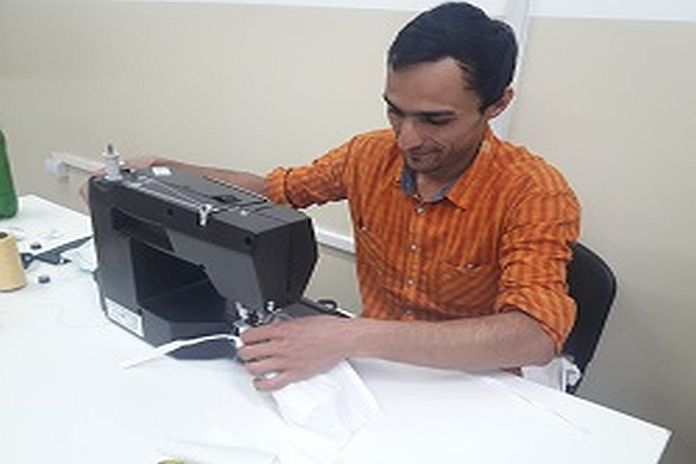COPENHAGEN, Denmark – As many countries in the World Health Organisation (WHO) / European region still struggle with the COVID-19 pandemic, refugees and migrants are playing an important part in efforts to fight the coronavirus, supporting health systems and communities with their skills across the region.
On World Refugee Day, WHO/Europe joins United Nations Secretary-General António Guterres in emphasizing the need to include refugees and migrants in efforts, plans and strategies to fight COVID-19.
The COVID-19 pandemic has had a significant impact on refugees and migrants in three distinct ways.
- In health: The conditions in which they may live and the lack of access to health care can put refugees and migrants at greater risk from the virus.
- In income: Refugees and migrants may work in the informal sector and in other occupations that lack social protection. Any loss of income is also likely to lead to a huge drop in the level of remittances sent back home, which many millions of people rely on.
- In protection: Border restrictions have been imposed by most countries around the world, making no exception for people seeking asylum from persecution. Xenophobia, racism and stigmatization have all increased during the pandemic.
WHO recently announced a closer collaboration with the United Nations High Commissioner for Refugees (UNHCR). The organizations will work side by side to ensure that preparedness, prevention and public health response measures to COVID-19 reach refugees, asylum seekers, internally displaced people and those who are stateless. By joining forces, both organizations will be able to better utilize resources and reinforce public health solutions on the ground.
“The COVID-19 pandemic has exacted an enormous human cost and demanded that health systems across the Region mount effective and inclusive responses that leave no one behind,” said Dr Hans Henri P. Kluge, WHO regional director for Europe.
“Yet it also offers countries an opportunity to recognize the valuable support – from health-care skills to cultural mediation to producing protective equipment – that refugees and migrants can offer to COVID-19 response efforts.[ On World Refugee Day,] I would like to thank refugees and migrants for the myriad ways that they are contributing to the COVID-19 response,” Dr Kluge added.
Together in the fight against COVID-19
The COVID-19 pandemic has proven once again that refugees and migrants can contribute to achieving universal health coverage. They also play a vital role in our struggle against the coronavirus. Whenever social, economic, administrative and legal barriers inhibiting refugees’ and migrants’ ability to support efforts have been lifted, they have contributed to better health for all.
During the COVID-19 pandemic, refugees and migrants have supported response efforts in various ways, including by:
- Coming forward if they have medical qualifications and offering their skills as health-care workers such as nurses, doctors and clinical assistants;
- Offering their help in essential services that cannot be interrupted, such as hospital cleaning and rubbish collection;
- Assisting as cultural mediators and translators in the dissemination of infection-prevention guidelines and health messages;
- Producing face masks, protective gear, soaps and other cleaning products;
- Forming volunteer groups to help the most vulnerable members of their communities, such as older people, by shopping for groceries and picking up medicines;
- Creating art and music that promotes messages of hope, solidarity and awareness; and
- Sharing strategies and information on how to remain healthy at home.
Personal stories from Turkey and Greece
Ahmed Ahmed, a Syrian refugee and nurse working in a migrant health centre in Izmir, Turkey, is proud to be part of a team united by the common goal of delivering health care during the pandemic.
“To address the health risks caused by COVID-19, I became part of a contact-tracing team, helping patients recall everyone whom they had been in close contact with during the time they were infectious,” explains Ahmed. “I also assisted as a translator when we were interviewing Arabic-speaking patients. Being able to communicate without language barriers and in a non-judgemental way is of the essence during contact tracing, especially as identifying possibly infected individuals is a time-sensitive matter – the sooner people are identified, the fewer people are at risk.”
“I fled Afghanistan almost 21 years ago,” says Qadir Hossaaini, a 38-year-old refugee from Afghanistan who is now working as an interpreter and health mediator. “In 2001, I was living in a refugee shelter in Greece, where I began to study Greek. Now, I am grateful I can help patients and doctors bridge the linguistic divide. Ensuring vulnerable people have access to the public health system is very gratifying and we continue our work despite COVID-19. We wear protective equipment and often have to reassure those who are worried about the virus.”
While refugees and migrants may live in conditions that make them particularly vulnerable to COVID-19, they are also part of a united response.






